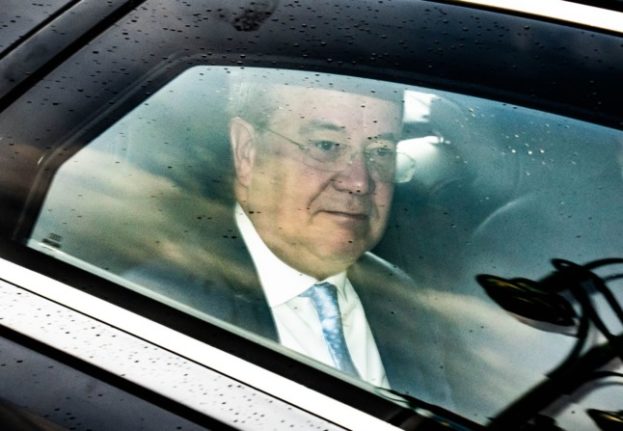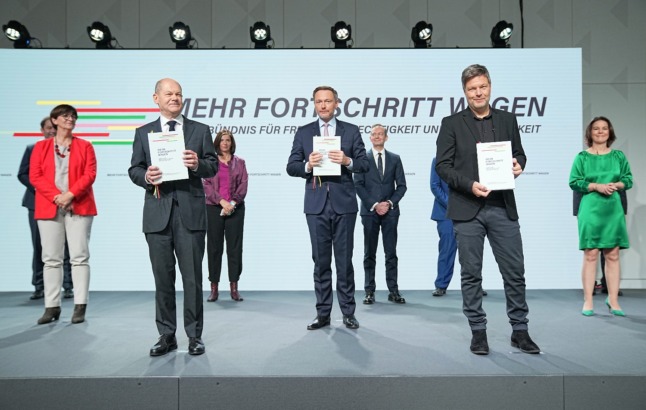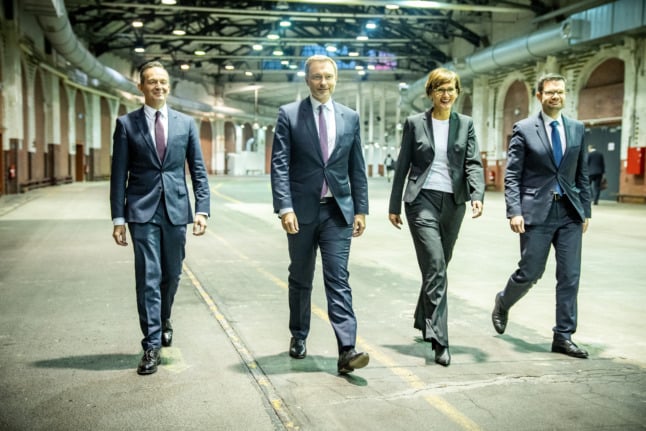Laschet’s CDU-CSU conservative alliance brought home its worst election result in post-war Germany of 24.1 percent, behind Olaf Scholz’s SPD on 25.7 percent.
But Laschet, the conservative bloc’s hope to succeed veteran Chancellor Angela Merkel, has insisted his party will still try to build a governing coalition and is ready for talks with the Greens and the liberal FDP for a possible partnership.
Though he admitted he could “not be satisfied with this result”, Laschet also claimed “no party” – not even the Social Democrats – could claim a mandate to govern from Sunday’s vote outcome.
But calls are growing louder for Laschet to admit defeat and resign, even from within his own party.
“You have lost. Please have some insight. Avert further damage to the #CDU and resign,” Ellen Demuth, a CDU member of the Rhineland-Palatinate state parliament, wrote on Twitter.
“We lost the election. Full stop,” said Tilman Kuban, the head of the CDU’s youth wing.
Marcus Mündlein, the chairman of the party’s youth wing in the state of Saxony, called for “a true new beginning” which he said could “only be successful if our leader and candidate for chancellor, Armin Laschet… resigns”.
READ ALSO:
- How is the race to form a new government shaping up?
- Five things you need to know about the German election
A stormy session is expected later Tuesday when the newly elected MPs of the CDU and Bavarian allies CSU sit down together for the first time since the vote.
Heavyweights dethroned
Elected as head of the CDU in January, Laschet was for some time the clear favourite to succeed Angela Merkel when she bows out of politics after Sunday’s election.
But his party’s ratings began to slide as he committed a series of gaffes, including being caught on camera laughing in the background during a solemn tribute to flood victims.
Sunday’s result is the first time the CDU and CSU, a dominant force in German politics since World War II, have scored under 30 percent in a general election.
The vote also saw a number of CDU heavyweights lose their direct mandates, including Economy Minister Peter Altmaier, Defence Minister AnnegretKramp- and Agriculture Minister Julia Klöckner.
Merkel’s former constituency on Germany’s Baltic Sea coast, which she had held since 1990, went to an unknown from the SPD.
READ ALSO: Merkel’s CDU seat held since 1990 snapped up by young SPD candidate
Official figures showed former CDU voters abandoning the party in droves, mostly in favour of the SPD and the Greens. But the party also lost ground to the far-right AfD in the former East Germany.
Economy Minister Peter Altmaier called the performance a “crushing defeat” for the CDU, admitting the party had “lost many swing voters”.
Michael Kretschmer, the state premier of Saxony, told the MDR broadcaster on Monday that he saw no clear mandate for the CDU to try to form a government.
‘Strong message from voters’
“I see a strong message from voters, who have made it clear that the (CDU-CSU) is not the first choice this time,” he said.
In a survey for the Funke media group on Monday, 70 percent of respondents said they thought Laschet should resign. Even among CDU supporters, the figure was 51 percent.
ANALYSIS: Who were the real winners and losers of Germany’s race to replace Merkel?
And in another post-election poll for Der Spiegel magazine, 63 percent said they thought Scholz should be Germany’s next chancellor, with only 24 percent backing Laschet.
Bernd Althusmann, the leader of the CDU in Lower Saxony, suggested the party should “humbly and respectfully accept the will of the voters”, while Hesse state premier Volker Bouffier stated plainly: “We have no claim to be in government.”
However, with a reputation for digging his heels in, Laschet has shown before that he does not give up easily – such as when he beat Markus Söder, the head of the CSU, to be named the conservative bloc’s chancellor candidate.
After a drawn-out and bruising battle, Laschet came through to secure the nomination.
Der Spiegel magazine has noted his ability to “sit out” his opponents, wearing them down.
Asked in a TV interview before the election if he thought he was often underestimated, Laschet replied that “many have certainly miscalculated”.
By Femke COLBORNE




 Please whitelist us to continue reading.
Please whitelist us to continue reading.
Member comments